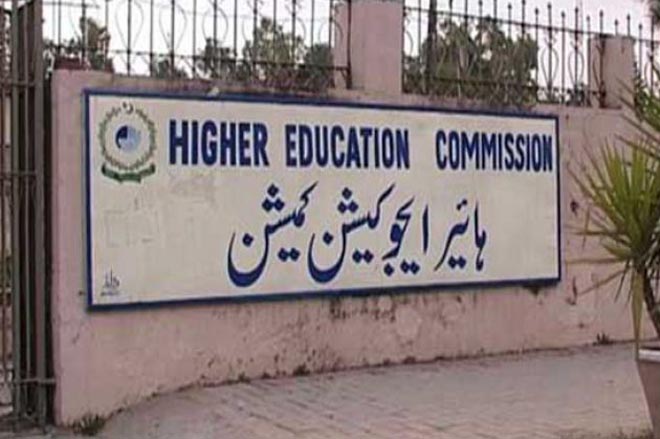ISLAMABAD ( BMZ REPORT )
The Higher Education Commission (HEC) Pakistan under the auspices of National Business Education Accreditation Council (NBEAC) organized the 3rd Deans and Directors Conference entitled “Strengthening Business Schools through Partnerships”. The conference, an annual event for determining the future of management education in Pakistan, aimed to discuss ways to strengthen business schools through industry-academia partnerships and present recommendations to enhance research activities and employability skills of business graduates.
Out of 180 business schools with campuses nationwide, deans and directors of 160 business academic units attended the conference along with international representation from 15 business schools of USA, UK, Canada, Switzerland, Russia, Malaysia, SAARC countries, etc. Over 500 faculty members participated in the conference including 100 industry experts and 15 foreign speakers.
Distinguished speakers from academia included Dr. Ishrat Husain, Director IBA, Dr. Syed Zahoor Hassan, LUMS, Prof. Ralf Boscheck, IMD Switzerland,Dr. Christophe Terrasse, EFMD Belgium, Dr. Zaher Zain, The University of Malaysia, Dr. Nauman Farooqi, Mount Allison University Canada, Prof. Konstantin Krotov, St. Petersburg University Russia, Prof. Kerry L. Laufer, Tuck School of Business-Dartmouth USA, Prof. F. Robert Wheeler, Founding Dean KSBL, Mr. Javed Hamid, International Executive Service Corps Washington DC, Dr. Ehsan ul Haq, LUMS and many others.
The key actionable message from many of the conference sessions was to manage both governance and quality issues, openness to the world in order to reach out to others for global assistance and human resource development as there is a great need to work together and collaborate.
The first session entitled “Essential Components of a Strategic Plan” recommended to strengthen links between academia and the corporate Sector as well as internationalization of strategic planning process. Dr. Ishrat Hussain suggested that all stakeholders should be involved in strategy planning and implementation process moreover, business schools should check their positive as well as negative impacts on the community and society and should subject themselves to the external evaluators.
The second session “Roles and Responsibilities of Business Schools, Teachers: Students Perspective” recommended that university education should be market oriented. Various solutions were proposed including focus on quality, teachers with industrial experience, importance of imparting IT and other technical skills, relevance of course content, and counseling and mentorship. The third session “Hiring and Motivating Qualified Faculty” highlighted several issues such as the quality ranking that puts pressure on Business Schools to conduct more research and hire qualified faculty, and expectations of faculty from management. The faculty should be able to inculcate knowledge in students and encourage critical thinking, revisiting hiring process in the public sector business schools.
During the workshop “Developing Entrepreneurs; Refining the Curriculum and guiding your faculty” it was propounded that entrepreneurship is a new management paradigm moreover, many experiences were shared through videos as how entrepreneurial learning can be enhanced. In the policy roundtable “How to cultivate research culture in business schools”, it was recommended to set up realistic targets so that the faculty is pushed towards research culture and ultimately they are induced to publish, categorize universities into different tiers and enhance research competencies of the faculty through training workshops and seminars.
The second day of the conference focused on industry collaborations and designing business curricula in accordance with the relevance of industry. Eminent speakers from Industry included Mr. Agha Zafar Abbas, CEO Kansai Paints, Mr. Sajjad Kirmani, CEO Infogistic, Mr. Arif Ijaz, Maple Leaf Cement, Mr. Osman Khalid Waheed, President Ferozsons Laboratories Limited, Mr. Omar Saeed, CEO Service Industries Limited, Mr. Adeel Anwar, Warid Telecom, Mr. Ali Khurram Pasha, Bank Alfalah, Dr. Faheem-ul-Islam, Ministry of Planning Development and Reforms, Mr. Mohammed Ali Khan, International Finance Corporation USA, Ms. Shahbano Hameed, Telenor Pakistan and many others.
The session on “Industry Expectations from Business Graduates” focused on concerns of industry such as lack of knowledge about corporate code of conduct, lack of report writing skills, inability to collaborate, in case of governmental projects there is a lack of trained graduates in the field of construction, energy, logistics and pharmaceuticals, etc. The session recommended to upgrade placement centers in the universities, provide mentors from the corporate sector who are not only alumni but beyond, encourage students to raise questions, enhance communication skills both oral and written, capability to generate new ideas and channelize academia and industry interaction.
The session entitled “Making business schools more relevant for industry- challenges and opportunities for forging linkages and partnerships” suggested to revisit curriculum, impart soft skills to students, and inclusion of business school faculty in corporate boards. While the key concerns of public administration were addressed during the policy roundtable focused around the process of Quality Assurance, the inefficiency in follow-up and the lack of accountability. The various challenges related to commerce education were also discussed.
In the closing ceremony, Syed Babar Ali, Founder and Chancellor LUMS, addressed the participants. He said that if we want business to survive and thrive, leaders should exhibit integrity and jobs should be assigned to competent individuals. The Chairman NBEAC, Dr. Hasan Sohaib Murad thanked all the participants for their participation and expressed his gratitude to national and international participating scholars, deans and directors of the business schools.

